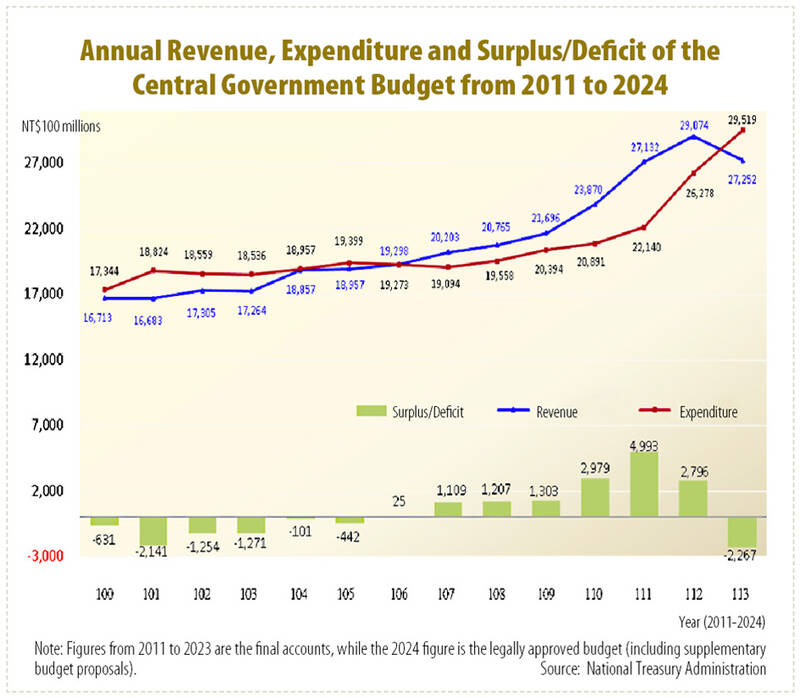Legislators are today and tomorrow to continue deliberating over about 800 budget-related proposals as they aim to finish a review of the central government’s budget before the legislative session ends tomorrow.
Ruling and opposition parties continued to debate the central government’s proposed 2025 budget with total expenditures of more than NT$3.13 trillion (US$95.1 billion).
On Friday, the Chinese Nationalist Party (KMT) and the Taiwan People’s Party (TPP) used their majority in the Legislative Yuan to cut NT$93.98 billion from the central government’s general budget.

The KMT has proposed cutting a total of NT$111 billion, or 3.47 percent, from the budget.
Under the recently amended Act Governing the Allocation of Government Revenues and Expenditures (財政收支劃分法), the central government must allocate NT$375.3 billion annually to local governments, affecting 28 percent of the budget, the Directorate-General of Budget, Accounting and Statistics has said.
If national defense expenditures are not reduced, it would affect 37 percent of the budget, it added.
Democratic Progressive Party (DPP) caucus chief executive Rosalia Wu (吳思瑤) yesterday said that in the 16 years of the administrations of former presidents Ma Ying-jeou (馬英九) and Tsai Ing-wen (蔡英文), the legislature on average cut the central budget by just 1.19 percent, about one-third of the opposition parties’ proposed 3.47 percent cut, the largest to the budget in history.
The opposition has been obstructing the central government from fulfilling its policy commitments and encroaching on the Executive Yuan’s budgetary authority, she said.
“Budget oversight should be rational,” but the opposition’s proposals “are driven by a desire to make governance difficult for the administration,” Wu said.
KMT Secretary-General Justin Huang (黃健庭) said that even with the 3.47 percent budget cut, President William Lai’s (賴清德) administration would still have a budget of NT$2.8 trillion to NT$2.9 trillion.
“This administration is incompetent,” he said, adding that previous administrations operated fine with a budget of about NT$2 trillion.
The central government under the DPP has wasted a significant amount of money and if the legislature did not conduct a thorough review, “we would be failing in our duties,” he said.
TPP Acting Chairman and caucus whip Huang Kuo-chang (黃國昌) on Thursday last week said that his caucus proposed cutting NT$200 billion and freezing NT$100 billion of the budget, accounting for about 10 percent of its total.
The opposition parties are fulfilling their duty by conducting a thorough review of a record-high budget, he said.
Huang Kuo-chang said that pro-DPP media and DPP legislators were spreading disinformation by claiming that legislators from opposition parties want to paralyze the government.
In 2012, Tsai, then-DPP chairperson, wrote on Facebook that government agencies’ budgets should be cut by 20 percent, he said.
“As a former minister, I know the government and ministries could still function with a 10 percent budget cut,” he said Tsai had written.
It is contradictory that Tsai could make such a statement and yet the TPP is being accused of paralyzing the government for its proposed budget cuts, he said.

US President Donald Trump said "it’s up to" Chinese President Xi Jinping (習近平) what China does on Taiwan, but that he would be "very unhappy" with a change in the "status quo," the New York Times said in an interview published yesterday. Xi "considers it to be a part of China, and that’s up to him what he’s going to be doing," Trump told the newspaper on Wednesday. "But I’ve expressed to him that I would be very unhappy if he did that, and I don’t think he’ll do that," he added. "I hope he doesn’t do that." Trump made the comments in

NOT AN OPENING: Trump’s violation of international law does not affect China’s consideration in attacking Taiwan; Beijing lacks capability, not precedent, an official said Taiwanese officials see the US’ capture of the president of Venezuela as a powerful deterrent to Beijing’s aggression and a timely reminder of the US’ ability to defeat militaries equipped with Chinese-made weapons. The strikes that toppled Venezuelan President Nicolas Maduro signaled to authoritarian leaders, including Chinese President Xi Jinping (習近平), US President Donald Trump’s willingness to use military might for international affairs core to US interests, one senior official in Taipei’s security circle said. That reassured Taiwan, the person said. Taipei has also dismissed the idea that Trump’s apparent violation of international law could embolden Beijing, said the official, who was not

A cold surge advisory was today issued for 18 cities and counties across Taiwan, with temperatures of below 10°C forecast during the day and into tonight, the Central Weather Administration (CWA) said. New Taipei City, Taipei, Taoyuan and Hsinchu, Miaoli and Yilan counties are expected to experience sustained temperatures of 10°C or lower, the CWA said. Temperatures are likely to temporarily drop below 10°C in most other areas, except Taitung, Pingtung, Penghu and Lienchiang (Matsu) counties, CWA data showed. The cold weather is being caused by a strong continental cold air mass, combined with radiative cooling, a process in which heat escapes from

Snow this morning fell on Alishan for the first time in seven years, as a strong continental cold air mass sent temperatures plunging across Taiwan, the Central Weather Administration (CWA) said. The Alishan weather station, located at an elevation of about 2,200m in central Taiwan, recorded snowfall from 8:55am to 9:15am, when the temperature dropped to about 1°C, the CWA said. With increased moisture and low temperatures in the high-altitude Alishan area, the conditions were favorable for snow, CWA forecaster Tsai Yi-chi (蔡伊其) said. The last time snow fell at the Alishan weather station was on Jan. 10, 2018, while graupel fell there